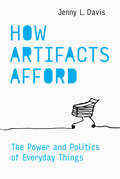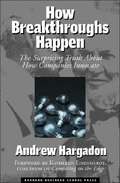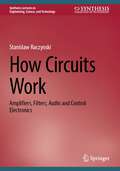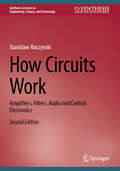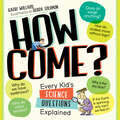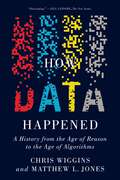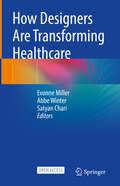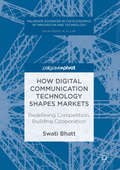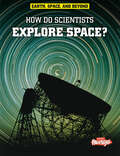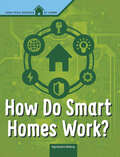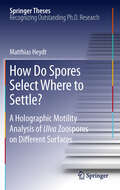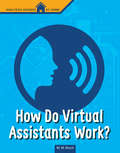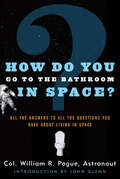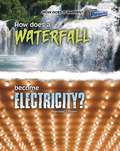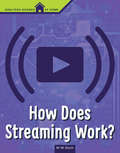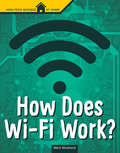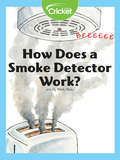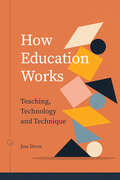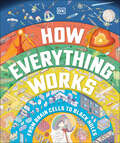- Table View
- List View
How Artifacts Afford: The Power and Politics of Everyday Things (Design Thinking, Design Theory)
by Jenny L. DavisA conceptual update of affordance theory that introduces the mechanisms and conditions framework, providing a vocabulary and critical perspective. Technological affordances mediate between the features of a technology and the outcomes of engagement with that technology. The concept of affordances, which migrated from psychology to design with Donald Norman's influential 1988 book, The Design of Everyday Things, offers a useful analytical tool in technology studies--but, Jenny Davis argues in How Artifacts Afford, it is in need of a conceptual update. Davis provides just such an update, introducing the mechanisms and conditions framework, which offers both a vocabulary and necessary critical perspective for affordance analyses.
How Big Is Your Energy Footprint? (Environmental Footprints)
by Paul MasonWhat sort of footprint are you leaving on the environment? Do you have a heavy footprint or a light footprint? Everything we do and everything we use has an impact on the environment. * Heavy footprints harm the environment and use lots of natural resources. * Light footprints harm the environment as little as possible and use fewer natural resources. Read the ENVIRONMENTAL FOOTPRINTS series to decide what type of footsteps you want to take in the future! In How Big Is Your Energy Footprint? read about what makes up an energy footprint and the effect this has on the environment. Discover ways to reduce your energy footprint and live sustainably. Special Features Rethink! feature offers ways to lighten your footprints. Case Studies give real-life examples of heavy-footprint and light-footprint actions. How Big Is Your Clothing Footprint? How Big Is Your Energy Footprint? How Big Is Your Food Footprint? How Big Is Your Shopping Footprint? How Big Is Your Travel Footprint? How Big Is Your Water Footprint?
How Breakthroughs Happen: The Surprising Truth About How Companies Innovate
by Andrew HargadonThis book presents lessons from the famous 'Invention Factories' past and present. Did you know that the incandescent lightbulb first emerged some thirty years before Thomas Edison famously 'turned night into day'? Or that Henry Ford's revolutionary assembly line came from an unlikely blend of observations from Singer sewing machines, meatpacking, and Campbell's Soup? In this fascinating study of innovation, engineer and social scientist Andrew Hargadon argues that our romantic notions about innovation as invention are actually undermining our ability to pursue breakthrough innovations. Based on ten years of study into the origins of historic inventions and modern innovations from the lightbulb to the transistor to the Reebok Pump athletic shoe, How Breakthroughs Happen takes us beyond the simple recognition that revolutionary innovations do not result from flashes of brilliance by lone inventors or organizations. In fact, innovation is really about creatively recombining ideas, people, and objects from past technologies in ways that spark new technological revolutions. This process of 'technology brokering' is so powerful, explains Hargadon, because it exploits the networked nature—the social side—of the innovation process. Moving between historical accounts of labs and factory floors where past technological revolutions originated and field studies of similar processes in today's organizations, Hargadon shows how technology brokers create an enduring capacity for breakthrough innovations. Technology brokers simultaneously bridge the gaps in existing networks that separate distant industries, firms, and divisions to see how established ideas can be applied in new ways and places, and build new networks to guide these creative recombinations to mass acceptance. How Breakthroughs Happen identifies three distinct strategies for technology brokering that managers can implement in their organizations. Hargadon suggests that Edison and his counterparts were no smarter than the rest of us-they were simply better at moving through the networked world of their time. Intriguing, practical, and counterintuitive, How Breakthroughs Happen can help managers transform their own firms into modern-day invention factories.
How Cars Work
by Tom NewtonHow Cars Work is a completely illustrated primer describing the 250 most important car parts and how they work. This mini test book includes wonderfully simple line drawings and clear language to describe all the automotive systems as well as a glossary, index, and a test after each chapter. How Cars Work provides the basic vocabulary and mechanical knowledge to help a reader talk intelligently with mechanics understand shop manuals, and diagnosis car problems. Tom Newton guides the reader with a one topic per page format that delivers information in bite size chunks, just right for teenage boys. How Cars Work was the most stolen book at Kennedy High School in Richmond California! Teachers like our title and so do librarians. The History channel, Modern Marvels-2000, Actuality Productions, Inc is using How Cars Work to train staff for a documentary on automobiles.
How Circuits Work: Amplifiers, Filters, Audio and Control Electronics (Synthesis Lectures on Engineering, Science, and Technology)
by Stanislaw RaczynskiThis book helps readers understand the basic concepts of electronic circuits. The emphasis is on amplifiers, filters and audio circuits. Other applications such as oscillators, multivibrators, logic and control circuits are also included. Although basic concepts are presented with the necessary theoretical background, the author uses descriptions of basic electronic circuits in a very compact form and the circuit functions are described in a very accessible manner.
How Circuits Work: Amplifiers, Filters, Audio and Control Electronics (Synthesis Lectures on Engineering, Science, and Technology)
by Stanislaw RaczynskiThis book helps readers understand the basic concepts of electronic circuits. The emphasis is on amplifiers, filters and audio circuits. Other applications such as oscillators, multivibrators, logic and control circuits are also included. Although basic concepts are presented with the necessary theoretical background, the author uses descriptions of basic electronic circuits in a very compact form and the circuit functions are described in a very accessible manner.
How Come?: Every Kid's Science Questions Explained
by Kathy WollardFact-filled, fun-filled, as interesting to parents as it is to kids, the How Come? series is the trusted source for lively, clear answers to kids’ science queries. Now the best questions and answers from all three books—How Come?; How Come? Planet Earth; and How Come? In the Neighborhood—have been revised, updated, freshly illustrated in full color, supplemented with twenty completely new questions, and combined into one bigger, better volume. How Come? explains, in fascinating detail, more than 200 mysteries and phenomena in the world around us. These are the questions that pique kids’ curiosity—and stump parents.When it rains, does running (rather than walking) to the nearest shelter really keep you any drier? How can a stone skip across a pond (instead of sink)? If the Earth is spinning, why can’t we feel it? Why don’t we fly off? Why do elephants have trunks? And the all-time classic, Why is the sky blue? (Sunlight has a hidden rainbow of colors, and air molecules scatter blues the most—sending bright blue light down to Earth.) The text is clearly written, engaging, and accessible. It’s for every kid who wants to know—and every grown-up who simply doesn’t know.
How Data Happened: A History from the Age of Reason to the Age of Algorithms
by Matthew L. Jones Chris Wiggins“Fascinating.” —Jill Lepore, The New Yorker A sweeping history of data and its technical, political, and ethical impact on our world. From facial recognition—capable of checking people into flights or identifying undocumented residents—to automated decision systems that inform who gets loans and who receives bail, each of us moves through a world determined by data-empowered algorithms. But these technologies didn’t just appear: they are part of a history that goes back centuries, from the census enshrined in the US Constitution to the birth of eugenics in Victorian Britain to the development of Google search. Expanding on the popular course they created at Columbia University, Chris Wiggins and Matthew L. Jones illuminate the ways in which data has long been used as a tool and a weapon in arguing for what is true, as well as a means of rearranging or defending power. They explore how data was created and curated, as well as how new mathematical and computational techniques developed to contend with that data serve to shape people, ideas, society, military operations, and economies. Although technology and mathematics are at its heart, the story of data ultimately concerns an unstable game among states, corporations, and people. How were new technical and scientific capabilities developed; who supported, advanced, or funded these capabilities or transitions; and how did they change who could do what, from what, and to whom? Wiggins and Jones focus on these questions as they trace data’s historical arc, and look to the future. By understanding the trajectory of data—where it has been and where it might yet go—Wiggins and Jones argue that we can understand how to bend it to ends that we collectively choose, with intentionality and purpose.
How Designers Are Transforming Healthcare
by Evonne Miller Abbe Winter Satyan ChariThis is an open access book.How Designers are Transforming Healthcare is a bold manifesto for change, demonstrating the value of a strategic design-led approach. Drawing on a rich array of real-world projects, this book illustrates how designers, in collaboration with clinicians and consumers, are co-creating transformative change across healthcare environments, products, services, and systems.In a fascinating multi-voice conversation, this book outlines how design methods and mindsets, including co-design, prototyping, design and futures thinking, facilitates creative problem-solving. The ideas, tools, and challenges in How Designers are Transforming Healthcare make it a vital text - a doer’s guide - for designers, clinicians, academics, consumers, and policymakers seeking innovative strategies for engagement, innovation and improvement in healthcare.
How Digital Communication Technology Shapes Markets
by Swati BhattThis Palgrave Pivot explores how communication technology such as the Internet has changed the nature of trade, focusing especially on economy-wide reductions in company size (granularity) and the role of retailers (disintermediation). By increasing access to comparative data, influencing conceptions of time, and reducing the number of intermediaries between creator and consumer, technological connectivity is changing the very definition of competition. In the new network economy, disintermediation and granularity are turning cooperative information gathering and sharing into a vital market institution. To exemplify the effects of communication technology, Bhatt focuses on two markets with particularly powerful effects on the economy: labor and education, and CIME (communication, information services, media, and entertainment). Mobile connectivity is radically changing the extent, capabilities, and operations of these markets, both in terms of the services they provide and how they interact with consumers. Bhatt also explores how these benefits intersect with new concerns about privacy and security when the line between public and private information is becoming ever more fluid.
How Do Smart Homes Work? (High Tech Science at Home)
by Agnieszka BiskupImagine you arrive at school and realize you forgot to feed the dog. No problem. Pull out your phone and command the dog dish to dispense a serving of food. That's all there is to it - if you live a smart home. What once sounded like science fiction is now a reality for some families. People use smart phones and other devices to lock doors, turn on lights, close window shades, and check to see how much milk they have in the fridge. Find out how this technology works and what the future holds for smart homes.
How Do Spores Select Where to Settle?
by Matthias HeydtIn this thesis, Matthias Heydt applies digital in-line holography to achieve for the first time a complete three dimensional and real time motion analysis of Ulva zoospores, both in solution and in the vicinity of different surfaces. These results provide previously unknown information about the behavior and mechanism spores use to select a suitable site for settlement. This work gives deeper insight into biofouling algae and stimulates new design strategies for antifouling coatings. Furthermore, the tracking system developed during this research could be used as a new system for assessing the antifouling performance on different surfaces at very early points in time, allowing disentanglement of surface conditioning and interaction of spores with pristine chemistries.
How Do Virtual Assistants Work? (High Tech Science at Home)
by M. M. EbochA virtual assistant by any name - Alexa, Siri, whoever - can be a sweet addition to your home. You might use one for simple jobs like playing music or streaming podcasts. And you might use one to communicate with friends and remind you about homework coming due while helping you make your breakfast. Find out how digital assistants work and what the future might hold for this part of a high-tech home.
How Do We Know What Information Sharing Is Really Worth?: Exploring Methodologies to Measure the Value of Information Sharing and Fusion Efforts
by Brian A. JacksonHow Do We Know What Information Sharing Is Really Worth?: Exporing Methodologies to Measure the Value of Information Sharing and Fusion Efforts (Research Reports)
How Do You Go to the Bathroom in Space?: All the Answers to All the Questions You Have About Living in Space
by William R. PogueHave you ever wondered what it's really like for an astronaut in outer space? From the exciting moments to the day-to-day details, from the serious to the humorous, you'll find answers to every question you've ever had about living in space!What does it feel like to be weightless? Would a sneeze propel you backward? What happens to your body in space? And, most importantly, how do you go to the bathroom in space?Find out the answers from the astronaut who for more than a decade held the world record for the number of days spent living in space!To take advantage of the renewed interest in space travel, thanks to the success of Packing for Mars, this re-release of the bestseller (with over a quarter million copies in print) features a fresh look, dozens of authentic NASA photographs, and an introduction by John Glenn.At the Publisher's request, this title is being sold without Digital Rights Management Software (DRM) applied.
How Do You Raise a Raisin?
by Pam Muñoz Ryan"People have been gobbling up this yummy nutritious treat for centuries. Ancient Greeks and Romans awarded raisins at sporting events. Astronauts have been taking raisins into space. Take a peek inside this tasty book-you'll find out how grapes become raisins, who introduced the seedless grapes, and the many uses for raisins besides snacks!" In between the facts about raisins, children will delight in the silly poems about raisins. This file should make an excellent embossed braille copy.
How Does A Waterfall Become Electricity? (How Does It Happen)
by Robert SneddenWhat is the world's tallest waterfall?What is the world's tallest waterfall? How do dams help generate water power? What happens when a waterwheel spins? This series explores the causes and effects that shape our world. From the underwater volcanoes that sprout into islands, to the rushing waterfalls that spark electric currents, this series demonstrates how both natural and man-made phenomena occur.
How Does Streaming Work? (High Tech Science at Home)
by M. M. EbochWhether you're watching a movie, bingeing on a classic TV show, or listening to your favorite song, you're probably streaming it. Videotapes, DVDs, and CDs are mostly just memories now. Streaming puts a world of options at your fingertips when you’re at home and, with a smartphone or tablet, when you're on the go. Find out how streaming was invented, how it works, and what the future might hold for this part of a high-tech life.
How Does Wi-Fi Work? (High Tech Science at Home)
by Mark WeaklandYou probably use Wi-Fi all the time to connect to the internet through your laptop, tablet, or phone. It's easy. Wi-Fi hotspots surround you as you go through your day - from school to a pizza place or coffee shop and then back home. Not so long ago, the internet wasn't as accessible. Find out how Wi-Fi works, how it became commonplace, and what it might do for you in the future.
How Does a Smoke Detector Work?
by Liz HuyckEver wonder why a smoke alarm goes off? A battery, siren, and metal can work together to detect smoke and sound the alarm when catching a whiff of smoke.
How Education Works: Teaching, Technology, and Technique (Issues in Distance Education)
by Jon DronIn this engaging volume, Jon Dron views education, learning, and teaching through a technological lens that focuses on the parts we play in technologies, from language and pedagogies to computers and regulations. He proposes a new theory of education whereby individuals are not just users but co-participants in technologies— technologies that are intrinsic parts of our cognition, of which we form intrinsic parts, through which we are entangled with one another and the world around us. Dron reframes popular families of educational theory (objectivist, subjectivist, and complexivist) and explains a variety of educational phenomena, including the failure of learning style theories, the nature of literacies, systemic weaknesses in learning management systems, the prevalence of cheating in educational institutions, and the fundamental differences between online and in-person learning. Ultimately, How Education Works articulates how practitioners in education can usefully understand technology, education, and their relationship to improve teaching practice.
How Everything Works
by DKDiscover an all-in-one encyclopedia that takes you on an explanatory tour of the world from your own body to outer space.Have you ever wondered how an email gets to someone on the other side of the world in just a few seconds or why it&’s a bad idea to stand under a tree during a thunderstorm? Discover the answers to all these questions and more with these mind-boggling how things work books for children aged 9 and above!Each page of this mind-blowingly detailed and ambitious encyclopedia will guide you through the natural world and the technology that surrounds you. Giant, page-filling illustrations take objects apart – or take the roofs and walls off buildings – to show you how they work, explaining both basic principles (such as photosynthesis) as well as broader concepts (like how all the living things in a rainforest interact). Explore each and every page of this engaging how things work book to discover:- Key insights into both the natural and human worlds- Striking photography that brings certain concepts to life- A diverse range of chapters coinciding with STEM subjects at school In this how things work encyclopedia, chapters range from the human body to cities and industry, to planet Earth, taking in sleep patterns, cooking, sewage systems, wind farms, fungi spores, and plate tectonics along the way. How Everything Works is perfect for children studying STEM subjects at school or anyone who is simply curious about how nature and the modern world work.
How Fermented Foods Feed a Healthy Gut Microbiota: A Nutrition Continuum
by M. Andrea Azcarate-Peril Roland R. Arnold José M. Bruno-BárcenaThis book examines the role of fermented foods on human gut health and offers a unique contribution to this rapidly growing area of study. Fermented foods have been consumed by humans for millennia. This method of food preservation provided early humans with beneficial bacteria that re-populated the gut microbiota upon consumption. However, novel methods of production and conservation of food have led to severed ties between the food that modern humans consume and the gut microbiota. As a consequence, there has been a documented increase in the prevalence of autoimmune diseases and obesity, which has been correlated to decreased diversity of gut microbes, while infectious disorders have decreased in the three past decades.With the intention of providing a thorough overview of the relationship between fermented foods, nutrition, and health, the editors have grouped the chapters into three thematic sections: food and their associated microbes, the oral microbiome, and the gut microbiome. After an introduction dedicated to the environmental microbiome, Part I provides an overview of what is currently known about the microbes associated with different foods, and compares traditional forms of food preparation with current industrial techniques in terms of the potential loss of microbial diversity. The chapters in Part 2 explore the oral microbiota as a microbial gatekeeper and main contributor to the gut microbiota. Part 3 introduces beneficial modulators of the gut microbiome starting with the establishment of a healthy gut microbiota during infancy, and continuing with the role of probiotics and prebiotics in health preservation and the imbalances of the gut microbiota. In the final section the editors offer concluding remarks and provide a view of the future brought by the microbiome research revolution.This study is unique in its emphasis on the convergence of two very relevant fields of research: the field of studies on Lactic Acid Bacteria (LAB) and fermented foods, and microbiome research. The relationship between these fields, as presented by the research in this volume, demonstrates the intimate connection between fermented foods, the oral and gut microbiota, and human health. Although research has been done on the impact of diet on the gut microbiome there are no publications addressing the restorative role of food as microbe provider to the gut microbiota. This novel approach makes the edited volume a key resource for scientific researchers working in this field.
How Flavor Works
by Jung H. Han Nak-Eon ChoiTaste is the number one driving force in the decision to purchase a food product and food consumption is the most critical function for living organisms to obtain the energy and resources essential to their vitality. Flavor and aroma are therefore universally important concepts: intrinsic to human well-being and pleasure, and of huge significance for the multi-trillion dollar global food business.How Flavor Works: the Science of Taste and Aroma offers a fascinating and accessible primer on the concepts of flavor science for all who have an interest in food and related topics. Professionals and students of food science and technology who do not already specialize in flavor science will find it a valuable reference on a topic crucial to how consumers perceive and enjoy food products. In this regard, it will also be of interest to product developers, marketers and food processors. Other readers with a professional (eg culinary and food service) or personal interest in food will also find the book interesting as it provides a user-friendly account of the mechanisms of flavor and aroma which will provide new insights into their craft.
